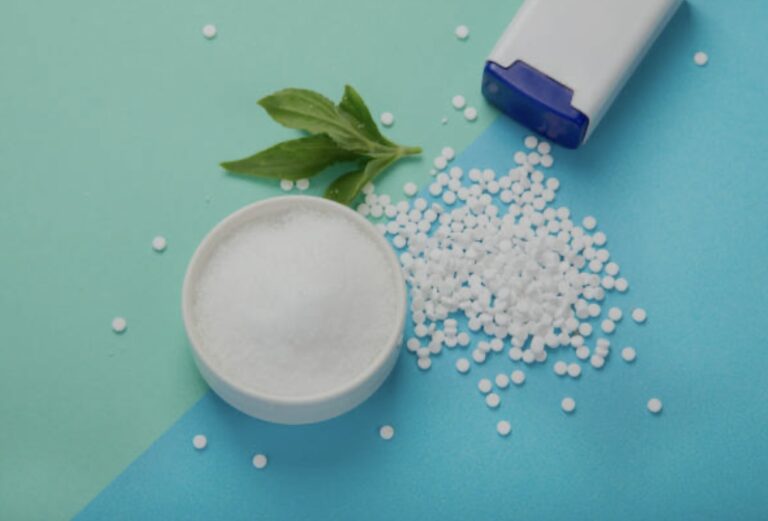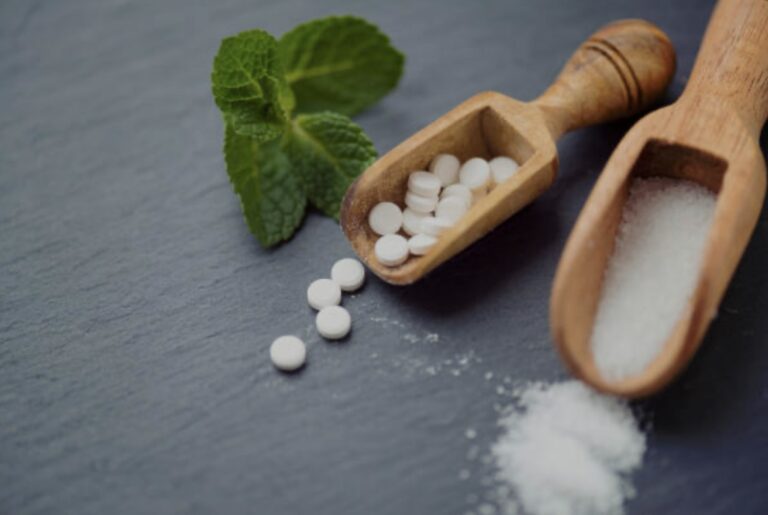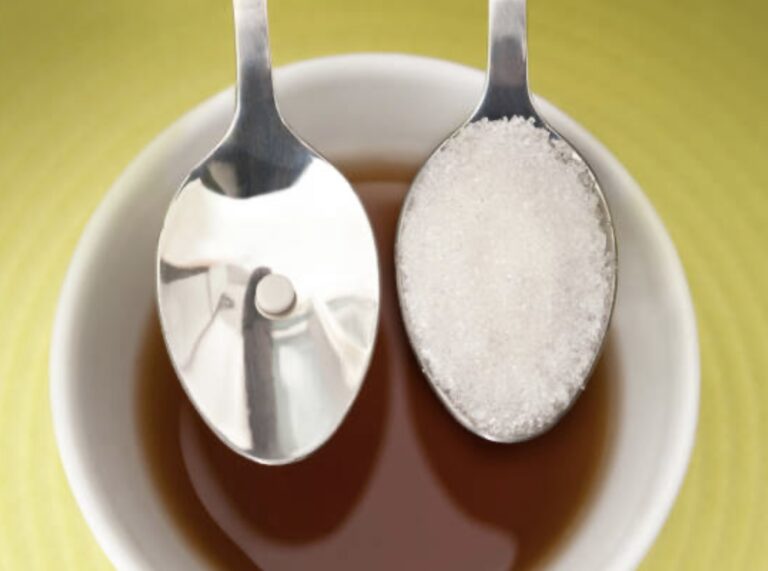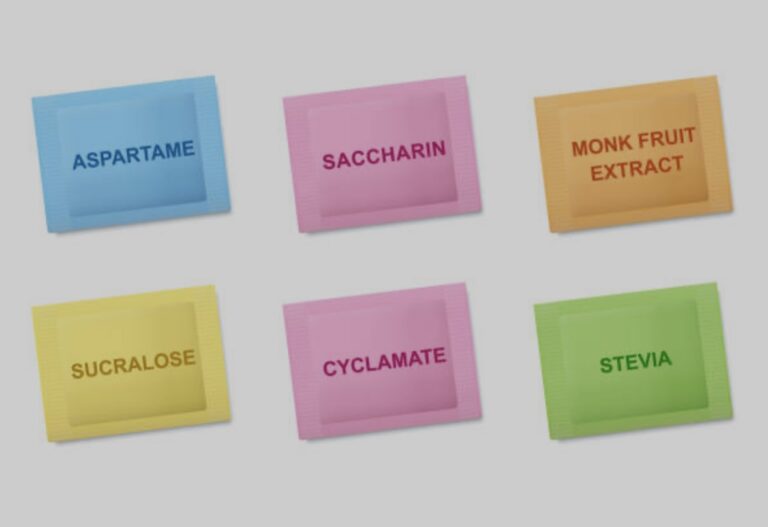The Bitter Truth: Unveiling the Hidden Dangers of Fake Sugar
Setting the Scene: Increasing Consumption of Artificial Sweeteners
In our modern pursuit of health and wellness, paradoxically, we’ve embraced artificial sweeteners with open arms, hoping to dodge the calories and cavities promised by their sugary counterparts. Yet, as consumption spikes, so do concerns and critiques. The bitter truth is that these fake sugars might be doing more harm than good. The dangers of fake sugar are often overlooked because of the advertising game of the food industry, cherry-picking food terms to make something seem much healthier than it is. Let’s bust these myths now.
Defining Fake Sugar: What Counts as Artificial Sweeteners
Artificial sweeteners, or ‘fake sugars,’ include a variety of chemicals and natural substitutes like aspartame, sucralose, and stevia. (stevia is although from a plant, more specifically in a future blog post on this) These are omnipresent in ‘diet’ sodas, ‘sugar-free’ treats, and many products advertised as healthier alternatives. But the tag ‘artificial’ should give us pause – how real can the benefits be?
Objective: Exploring the Untold Side of Artificial Sweeteners
This blog post peels back the sweet facade to reveal the hidden, and often bitter, truths about artificial sweeteners. With a dose of skepticism, we’ll dive into the unsettling implications these substances have on health, well-being, and society.

The Science Behind Artificial Sweeteners
The Making of Fake Sugar: A Brief Overview
Artificial sweeteners are synthesized in labs, a fact that hardly inspires confidence. These chemical concoctions aim to mimic sugar’s sweetness without the calories, a noble goal with questionable execution.
How Our Bodies Process Artificial Sweeteners Differently Than Natural Sugar
Our bodies are not fooled. Unlike natural sugars, metabolized for energy, artificial sweeteners pass through our systems relatively untouched. This unnatural process has downstream effects on metabolism and hunger signals, conspiring against our health and diet goals.
Long-Term Effects on Metabolism
Studies have painted a grim picture of prolonged artificial sweetener use, linking it to altered metabolic processes and insulin sensitivity. It’s increasingly clear that these substances might be sabotaging more than just our taste buds.

Health Implications of Regularly Consuming Artificial Sweeteners
Weight Management Controversies
The Myth of Weight Loss
The promise of weight loss is a sweet lie. Evidence suggests artificial sweeteners may contribute to weight gain, by confusing our body’s ability to gauge caloric intake, leading to overeating.
Impact on Hunger and Satiety Signals
Fake sugars send mixed messages to our brains, disrupting the natural balance of hunger and fullness cues. This hormonal tug-of-war can leave us feeling hungrier and less satisfied than ever.
Association with Increased Body Weight and Obesity
It’s no coincidence that obesity rates mirror the rise of artificial sweetener use. This correlation, while not causation, should be enough to sour our trust in these chemical concoctions.
Risks to Mental Health
Links Between Artificial Sweeteners and Mood Disorders
The brain is not immune to artificial sweeteners’ effects. From depression to anxiety, the mental health implications are as concerning as they are overlooked.
Potential Impact on Sleep Patterns
Restless nights might be another unwelcome side effect of fake sugar consumption. Interrupted sleep patterns have been observed, further eroding our mental and physical health.
The Anxiety and Depression Connection
The mood-destabilizing properties of artificial sweeteners can exacerbate conditions like anxiety and depression, making them a risky gamble for those already struggling.

Physical Health Concerns
Gut Health and Microbiome Disruption
The havoc artificial sweeteners wreak on our gut microbiota is perhaps their most damning indictment. These chemicals can decimate beneficial gut bacteria, fundamental to our overall health.
Increased Risk of Type 2 Diabetes
Ironically, these sugar substitutes, often consumed to mitigate diabetes risk, have been linked to an increased risk of developing type 2 diabetes. It seems the cure might be as bad as the disease.
The Debate Over Cancer Risk
While the jury is still out, the shadow of cancer looms large over artificial sweeteners. Continued research is critical, but the potential connection is a chilling reminder of what we don’t yet know.
Behavioral and Psychological Effects
The Addiction Cycle: Cravings and Overconsumption
The addictive nature of sweet tastes, real or fake, can trap us in a cycle of cravings and overconsumption. Breaking free requires acknowledging the powerful grip these substances can have.
Understanding the Reward Pathway
Artificial sweeteners hijack the brain’s reward system, compelling us to seek out more sweetness in a never-ending cycle of craving and consumption. This manipulation of our brain’s wiring is deeply troubling.
Why Artificial Sweeteners May Increase Cravings for Sweet Foods
Artificial sweeteners could be heightening our cravings for sweet foods by desensitizing our taste buds to sweetness, a cruel irony for those looking to cut back.

Breaking the Cycle: Strategies for Reducing Dependence
The first step is awareness. Recognizing the far-reaching effects of artificial sweeteners is crucial to loosening their hold. Opting for natural sugars in moderation, and embracing whole foods, can recalibrate our taste buds and bodies towards better health.
Perception and Taste Preferences
How Fake Sugar Alters Taste Perceptions
Our palates are being hijacked by the hyper-sweetness of artificial sweeteners, dulling our appreciation for the subtle sweetness found in nature.
Impact on Dietary Choices and Nutrition
This warped perception can steer us towards nutritionally vacant foods, perpetuating a diet that’s anything but balanced. The nutritional trade-off is stark and seldom worth it.
Encouraging Healthy Eating Habits
Breaking the cycle requires a conscious effort to seek out and appreciate the natural flavors in wholesome foods, an endeavor that pays dividends for our health.

The Placebo Effect and Its Implications
Belief in Health Benefits Without Scientific Backing
The placebo effect is strong with artificial sweeteners, where belief in their health benefits persists despite mounting evidence to the contrary. This disconnect from reality is a significant hurdle to public health.
Psychological Impact of “Diet” and “Zero-Calorie” Labels
The allure of ‘diet’ and ‘zero-calorie’ labels is hard to resist. However, these marketing tactics often mask the lack of nutritional value and potential dangers lurking within.
Making Informed Food Choices
Societal and Environmental Considerations
The Economic Impact of Artificial Sweetener Production
The artificial sweetener industry is a juggernaut, driven by profit margins, not public health interests. The economic incentives behind pushing these products ignore the societal costs of their consumption.
Cost Implications for Consumers and Manufacturers
Manufacturers benefit from the cheaper production costs of artificial sweeteners, while consumers pay the price financially and health-wise.
Market Trends and Consumer Demand
Despite growing awareness, market trends still favor artificial sweeteners, driven by consumer demand for low-calorie options. This demand fuels a cycle of supply and dubious innovation, with little regard for the consequences.

Environmental Concerns
Sustainability of Production Processes
The environmental footprint of producing artificial sweeteners, from resource extraction to manufacturing, raises serious sustainability questions.
Waste and Pollution: The Less Talked About Side
Beyond the human health impact, the waste and pollution generated by the artificial sweetener industry suggest an ecological price tag we’re only beginning to understand.
Ethical Questions
Misleading Marketing Practices
The marketing of artificial sweeteners often crosses into ethical gray areas, with health claims that are overstated at best and deceptive at worst.
Accessibility and Health Equity
Artificial sweeteners, often found in ‘diet’ and ‘health’ foods, are marketed as virtuous, yet they might be perpetuating health disparities, a bitter pill to swallow for those genuinely striving for better health.
Regulation and Policy Challenges
The regulatory landscape is a labyrinth, with vested interests often dictating the direction of artificial sweetener policy. This lack of clarity and oversight leaves consumers navigating a minefield of misinformation.

So Are The Dangers Of Fake Sugar Real? YES
Artificial sweeteners are not the panacea they were once made out to be. The evidence suggests a range of detrimental effects on mental and physical health, environmental sustainability, and societal well-being.
Personal Responsibility and Making Informed Choices
Acknowledging the bitter truth about fake sugar is the first step. Each choice we make is a vote for the kind of food system we want to participate in. Opting for natural, minimally processed foods is a step back towards health and away from the chemical concoctions masquerading as food.
The Road Ahead: Future Research and Policy Implications
As our understanding evolves, so too must our policies and practices. Prioritizing public health over profit, demanding transparency in food labeling, and supporting sustainable food systems are critical moves in the right direction.
Frequently Asked Questions
Artificial sweeteners are chemicals designed to sweeten food without the calories of natural sugars. They’re processed by our bodies differently and can have unintended health effects.
Despite their calorie-free promise, artificial sweeteners may contribute to weight gain and obesity by disrupting our body’s natural hunger signals and metabolism.
While there are recommended limits, the safest approach is to minimize consumption and opt for natural sugars in moderation.
Children are particularly susceptible to the sweet tastes of artificial sweeteners, which can impact their taste preferences and diet choices for life. The potential health risks apply as much, if not more, to them.
Consider natural sweeteners like honey, maple syrup, or agave in moderation. Ultimately, reducing overall sugar intake and embracing the natural flavors of food is healthiest.


